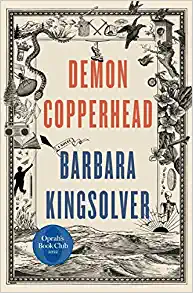Demon Copperhead author and Ky. native Barbara Kingsolver talks about the opioid epidemic and Appalachia's difficulty with it - Hallo friend
CHOOSE HEALTHY, In the article you read this time with the title Demon Copperhead author and Ky. native Barbara Kingsolver talks about the opioid epidemic and Appalachia's difficulty with it, we have prepared well for this article you read and download the information therein. hopefully fill posts
items ALTERNATIVE MEDICINE,
items COMMERCIAL,
items GENERIC,
items HEALTH,
items HEALTHY RECIPES, we write this you can understand. Well, happy reading.
Title :
Demon Copperhead author and Ky. native Barbara Kingsolver talks about the opioid epidemic and Appalachia's difficulty with itlink :
Demon Copperhead author and Ky. native Barbara Kingsolver talks about the opioid epidemic and Appalachia's difficulty with it
see also
Demon Copperhead author and Ky. native Barbara Kingsolver talks about the opioid epidemic and Appalachia's difficulty with it
 |
| Barbara Kingsolver (Facebook photo) |
Barbara Kingsolver says she intended her Pulitzer Prize-winning novel
Demon Copperhead to be her "great Appalachian novel" that told the story of how the opioid epidemic has ravaged the region, and its impact on children.
Ezra Klein of
The New York Times interviewed Kingsolver, who grew up in Nicholas County, for his podcast, "The Ezra Klein Show." The Times transcribed the
interview. It is wide-ranging, but a big chunk has her telling Klein how the opioid epidemic has impacted a whole generation of children who have become orphans and are being raised by grandparents and the foster system — and getting the bulk of their social services at school.
"We have a generation of orphans coming up through our schools," Kingsolver said, adding later, "There’s so many more kids in need than there are social networks to catch them — but the caseworkers are so overloaded and so pathetically underpaid. . . . This is something that I think the world needs to know about, this country — voters — need to know about. We need to know how this epidemic has left a generation of innocents that nobody’s taking decent care of. . . . These kids have been left behind. Our burdened public school systems are being asked to raise these kids."
Klein and Kingsolver also talked about how Central Appalachia was targeted by Purdue Pharma with a drug that was so addictive and with doctors who were told otherwise. "This was done to them," Kingsolver said of her neighbors in southwest Virginia and southeastern Kentucky. "Nobody wants to be addicted."
 |
| Winner of the 2023 Pulitzer for fiction |
Kingsolver also talked about the stigma associated with addiction and how people have been brainwashed to think it is a moral failing, instead of the brain disease that it is.
"We have been trained, culturally trained, to think of addiction in this way, as a personal failing that needs to be punished. Incarceration does not cure addiction any more than it cures cancer. Addiction is a disease," she said. "It’s impossible to describe how terrible this disease is, not just the dope sickness of it but the fact that your entire life has to become just a really difficult, hard work in process of, every morning, getting your means, getting your fix, getting through another day. And nobody wants to live like that."
Kingsolver told Klein that she hopes her novel will help people have more compassion and think of people with addiction as having a disease and to get rid of the idea that you don't treat a person with addiction until they "hit bottom."
"That’s how we treat the disease of addiction. And it’s incredibly inhumane. And effective treatment will only happen after we switch over from putting this in the hands of the police and the prisons to medical workers who can meet addicted people where they live and offer them the first steps of clean needles and fentanyl test strips so that they won’t die in the weeks that it will take for them logistically, physically, emotionally, to get to the beginnings of treatment," she said.
And to those who maintain a moral objection to such "harm reduction" programs, she said, "It’s as if people feel that addicted people deserve to die. Imagine if we looked at any other disease that way."
thus Article Demon Copperhead author and Ky. native Barbara Kingsolver talks about the opioid epidemic and Appalachia's difficulty with it
that is all articles Demon Copperhead author and Ky. native Barbara Kingsolver talks about the opioid epidemic and Appalachia's difficulty with itThis time, hopefully can provide benefits to all of you. Okay, see you in another article posting
.
You now read the article Demon Copperhead author and Ky. native Barbara Kingsolver talks about the opioid epidemic and Appalachia's difficulty with it with the link address https://choosehealthys.blogspot.com/2023/08/demon-copperhead-author-and-ky-native.html


0 Response to "Demon Copperhead author and Ky. native Barbara Kingsolver talks about the opioid epidemic and Appalachia's difficulty with it"
Post a Comment